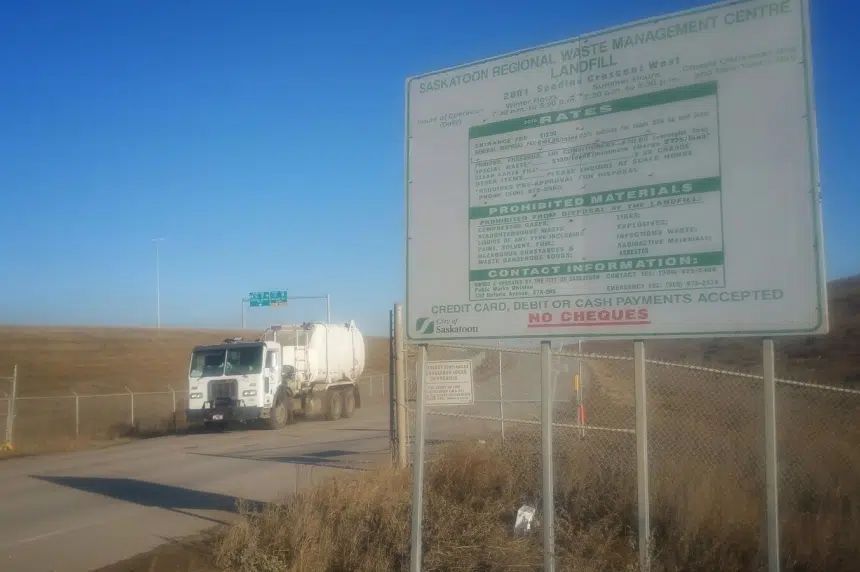The City of Saskatoon is looking into changing how people pay for garbage collection.
The city’s environment, utilities and corporate services committee reviewed a report on the issue this week.
The report proposes moving to what’s called a utility model. That is, making people pay based on how much garbage they put out, and/or what type of material they’re throwing away.
Speaking with 650 CKOM’s Brent Loucks on Tuesday, Mayor Charlie Clark said Saskatoon doesn’t do as good a job of keeping waste out of its landfill as other nearby cities.
“Our waste diversion rate is 21 per cent. In Edmonton, they’re up over 55 per cent. Halifax is 61 per cent. Winnipeg, next door, is at 31 per cent,” he said.
In the long term, the city is trying to avoid opening a new landfill. Budget pressures have made that goal even more important, as money hasn’t been available to fully fund payments into a reserve fund meant to eventually cover the cost.
Clark said he understands people may get upset if they find themselves paying more for garbage pickup, but the high price and difficulty of finding and building a new landfill site requires the city to act.
“By not doing anything, we’re pushing off some huge costs down the road to future councils and future citizens,” he said.
Clark noted the clock is ticking when it comes to easing the strain on the current landfill.
“It looks like we have a decade left in that landfill if we manage it properly. Maybe even more than that. But that is contingent on us getting our diversion rates up,” he said.
Clark said citizens can expect to have plenty of information made available to them as the city continues pursuing a new system.
“I know it’s controversial and some people are going to say ‘you’re just finding a new tax.’ We’re going to try and be as transparent as we can and make it clear how we’re doing it and how the numbers work,” he said.
However, much like the blue bin recycling program introduced a few years back, Clark said he thinks people will eventually embrace a new system.
Clark added that while some people would face the prospect of higher costs, a new system could also mean lower bills for people who take the time to do things like recycle and compost.
“We’re not reinventing the wheel here, either. This is the way that most cities in Canada have already gone and are already going,” he said.
Clark said some systems already in place in other cities charge people based on the weight of the garbage they put out. Others use a system of charging people based on whether they fill up a small, medium or large bin.
The committee voted to have administration keep studying the garbage collection issue. Another report is expected in August.
Group calls for bottled water ban
The committee also heard from the Saskatoon chapter of the Council of Canadians.
The group wants Saskatoon to consider becoming a Blue City when it comes to water.
The designation would require the city to recognize access to safe drinking water as a human right and promote publicly financed, owned and operated water and wastewater treatment facilities.
The group also wants the city to ban the sale of bottled water at municipal events and facilities. The group acknowledged there could be some costs up front if the city goes along with the move, including installing more water fountains and coming up with more ways to get water to people at public events, such as “water wagons” allowing people to fill up their reusable bottles.
Clark said he was broadly supportive of promoting the city’s water services, noting the irony that people pay good money to have the city produce clean drinking water, but still pay a premium to buy bottles.
However, he said any move to a ban on bottled water sales at city events is a long way off, with no immediate plans to bring the issue to council.







